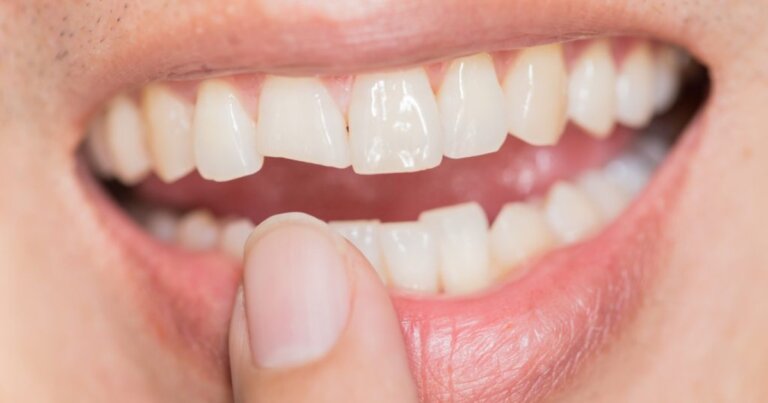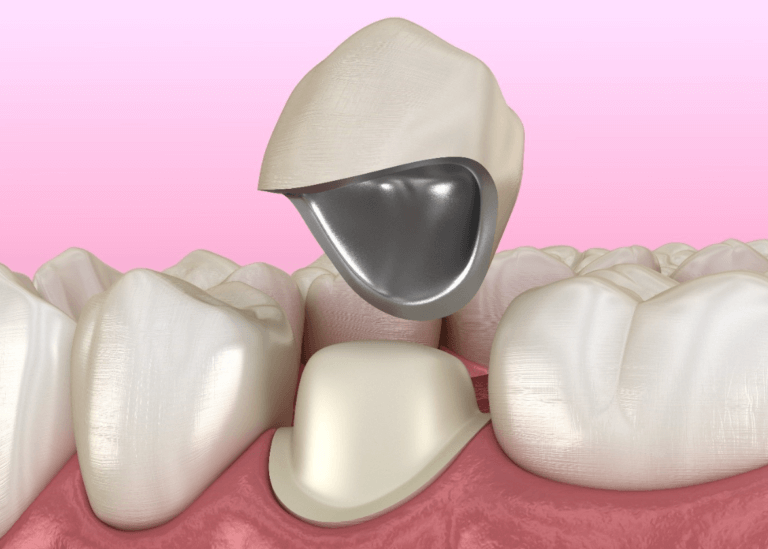Chipped Dental Crown

What Is A Chipped Dental Crown?
A dental crown is a type of dental restoration that is placed over a tooth to protect it and restore its shape, size, and strength. Crowns are typically made of materials such as porcelain, ceramic, or metal, and are designed to last for many years with proper care. They are bonded to the tooth using a special dental cement.
A chipped dental crown refers to a situation where a portion of the crown breaks off, leaving the underlying tooth exposed. This can happen due to various reasons, including trauma to the mouth, biting on hard objects, or wear and tear over time. A chipped dental crown can cause discomfort, sensitivity, and even further damage if left untreated. Before you contact a Toronto dentist to examine a Chipped Dental Crown, there are some things you should know as a patient:
- Why Do I Have A Chipped Dental Crown?
- Signs And Symptoms Of A Chipped Dental Crown
- Treatment Options For A Chipped Dental Crown
- How To Prevent A Chipped Dental Crown
- Managing A Chipped Dental Crown Until You Can See The Dentist
If you have questions about a Chipped Dental Crown or other dental problems, please contact us for more information.
Why Do I Have A Chipped Dental Crown?
There are several reasons why a dental crown may chip, including:
- Biting on hard objects: Chewing on ice, hard candy, or pens can cause a chipped dental crown.
- Teeth grinding: People who grind or clench their teeth at night may chip their dental crowns due to the excessive pressure.
- Trauma to the mouth: A fall, sports injury, or other types of accidents can cause a chipped dental crown.
- Natural wear and tear: Over time, dental crowns may weaken and become more prone to chipping.
- Poor fitting: A poorly fitted crown may not be able to withstand the pressure of biting and chewing, leading to chips and cracks.
It is important to identify the underlying cause of a chipped dental crown to prevent it from happening again in the future. A dentist can help diagnose the cause and recommend appropriate treatment options. If you have further questions about a Chipped Dental Crown, please contact us.
Signs And Symptoms Of A Chipped Dental Crown
If you have a chipped dental crown, you may experience some of the following signs and symptoms:
- Sensitivity: You may experience sensitivity or pain when biting down or chewing.
- Visible damage: You may notice a visible chip or crack in your dental crown, which may look like a small piece of your tooth is missing.
- Roughness: You may feel a rough or jagged edge on your dental crown with your tongue or finger.
- Loose crown: A chipped dental crown may become loose or fall out entirely.
- Gum irritation: If the chipped area is sharp or jagged, it may irritate the surrounding gum tissue.
If you experience any of these symptoms, it is important to seek prompt dental attention. A dentist can evaluate the extent of the damage and provide appropriate treatment to prevent further complications. Delaying treatment may lead to more extensive damage, pain, and infection. If you have further questions about signs and symptoms related to a Chipped Dental Crown, please contact us.
Treatment Options For A Chipped Dental Crown
The treatment for a chipped dental crown may vary depending on the severity of the damage and the underlying cause. Some common treatment options include:
- Dental bonding: If the chip is small, a dentist may use tooth-colored composite resin to fill in the damaged area.
- Smoothing off the rough edge: If the chipped area is small, superficial and not very noticeable, the dentist may be able to simply smooth off the rough edge.
- Crown replacement: If the damage is significant, a new crown may need to be placed.
It is important to seek prompt treatment for a chipped dental crown to prevent further damage and to avoid potential infection or tooth loss. If you have further questions about treatment options for a Chipped Dental Crown, please contact us.

How To Prevent A Chipped Dental Crown
Although it is impossible to completely prevent a chipped dental crown, there are several things you can do to reduce your risk of experiencing this dental issue, including:
- Avoid chewing on hard objects: Refrain from chewing on hard items like ice, hard candy, or pens that can damage dental crowns.
- Wear a mouthguard: If you participate in contact sports or have a habit of teeth grinding, wearing a mouthguard can help protect your teeth and dental crowns. Moreover, if you clench or grind your teeth at night, have your dentist make for you a custom-fitted night guard.
- Practice good oral hygiene: Regular brushing, flossing, and dental check-ups can help prevent tooth decay and damage to your teeth and dental crowns.
- Address any issues promptly: If you notice any discomfort or changes in your dental crown, seek prompt dental attention to prevent further damage.
By following these preventative measures, you can reduce your risk of experiencing a chipped dental crown and maintain your oral health. If you have further questions about how to prevent a Chipped Dental Crown, please contact us.
Managing A Chipped Dental Crown Until You Can See The Dentist
If you have a chipped dental crown and are unable to see a dentist immediately, there are several things you can do to manage the situation until you can receive professional treatment, including:
- Keep the chipped part of the dental crown in a safe place: Place the chipped part of the dental crown in a bag and keep it in a safe place. Do not forget to bring it with you to your dental appointment.
- Practice good oral hygiene: Keeping the area around the chipped crown as clean as possible can help prevent further tooth decay and other unwanted complications. Brush and floss gently around the exposed tooth. Rinsing your mouth with warm salt water or mouthwash can help reduce infection, inflammation and alleviate toothache pain. You can buy any mouthwash available at your pharmacy or health foods store. Alternatively, you can mix a teaspoon of salt in a cup of warm water and swish the solution around your mouth for about 30 seconds before spitting it out.
- Avoid eating hard or sticky foods: Stick to soft foods and avoid chewing on the affected side of your mouth. If the tooth feels sensitive to hot or cold, it is best to eat lukewarm food and drink for the time being.
- Use Over-the-Counter Pain Medication: Over-the-counter pain medication, such as Advil (ibuprofen) or Tylenol (acetaminophen), can help relieve tooth pain or sensitivity from a loose dental crown. Follow the instructions on the label and do not exceed the recommended dose. Unless you have a health condition that prevents you from taking either ibuprofen or acetaminophen, the absolute maximum dose that I recommend patients take for the worst dental pain is 600 mg ibuprofen combined with 1000 mg acetaminophen every 4 to 6 hours.
It is important to remember that these are temporary solutions and that you should seek professional dental care as soon as possible. A dentist can assess the extent of the damage and provide appropriate treatment to restore your dental crown and prevent further complications. If you have further questions about managing a Chipped Dental Crown, please contact us.

